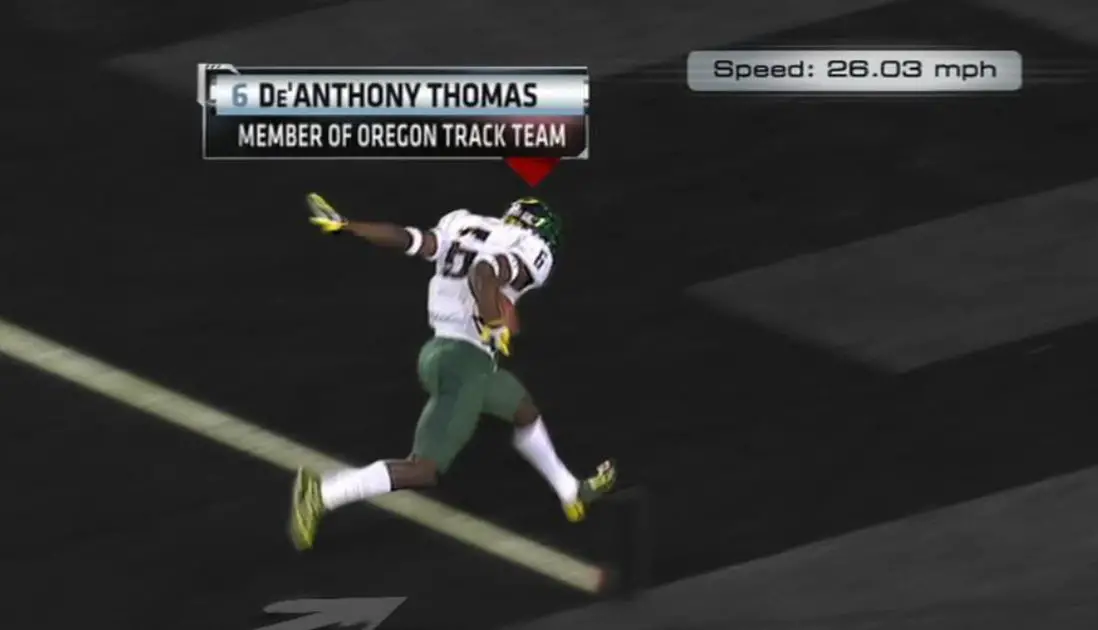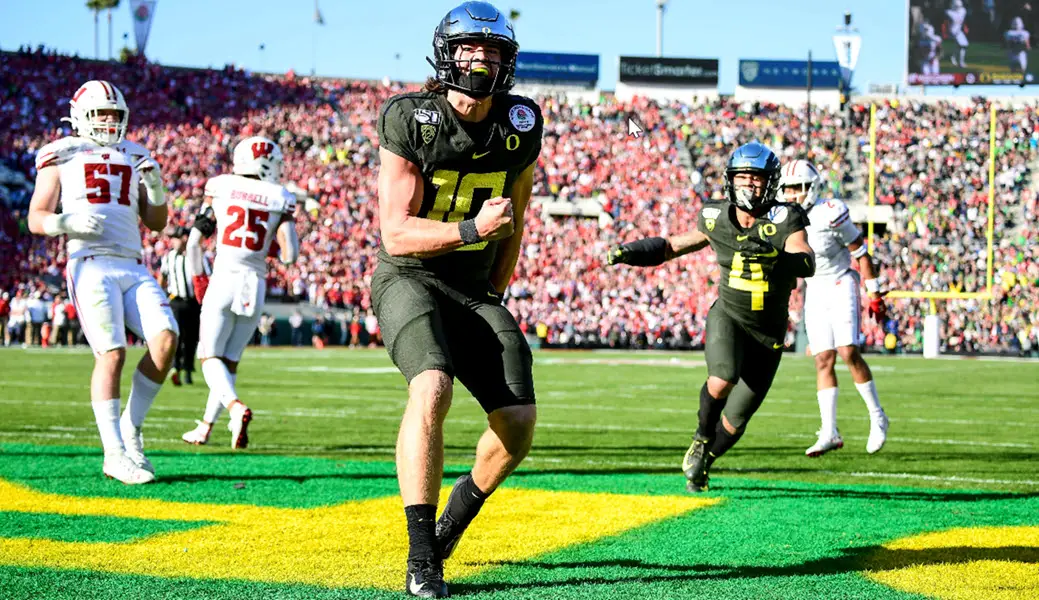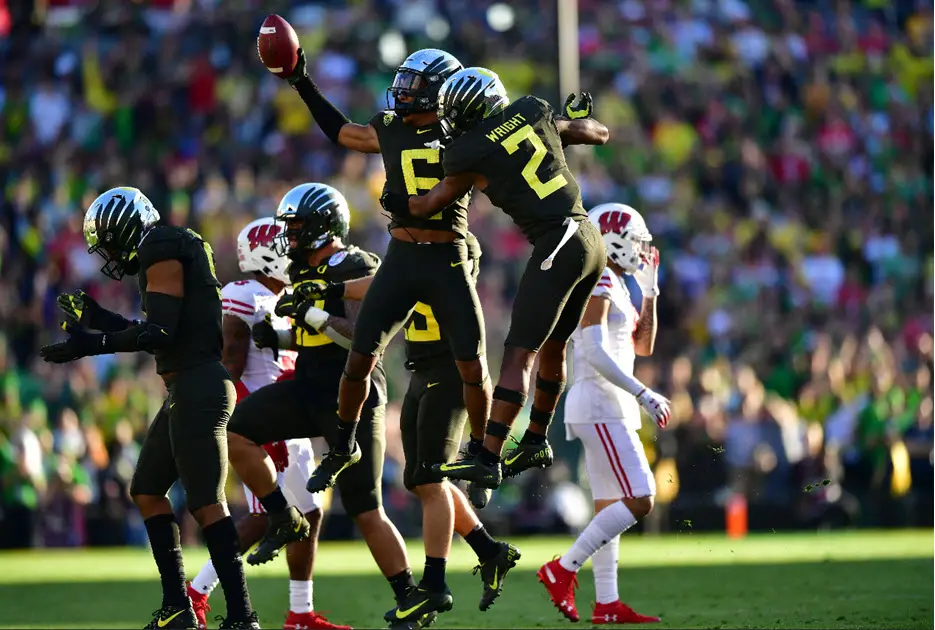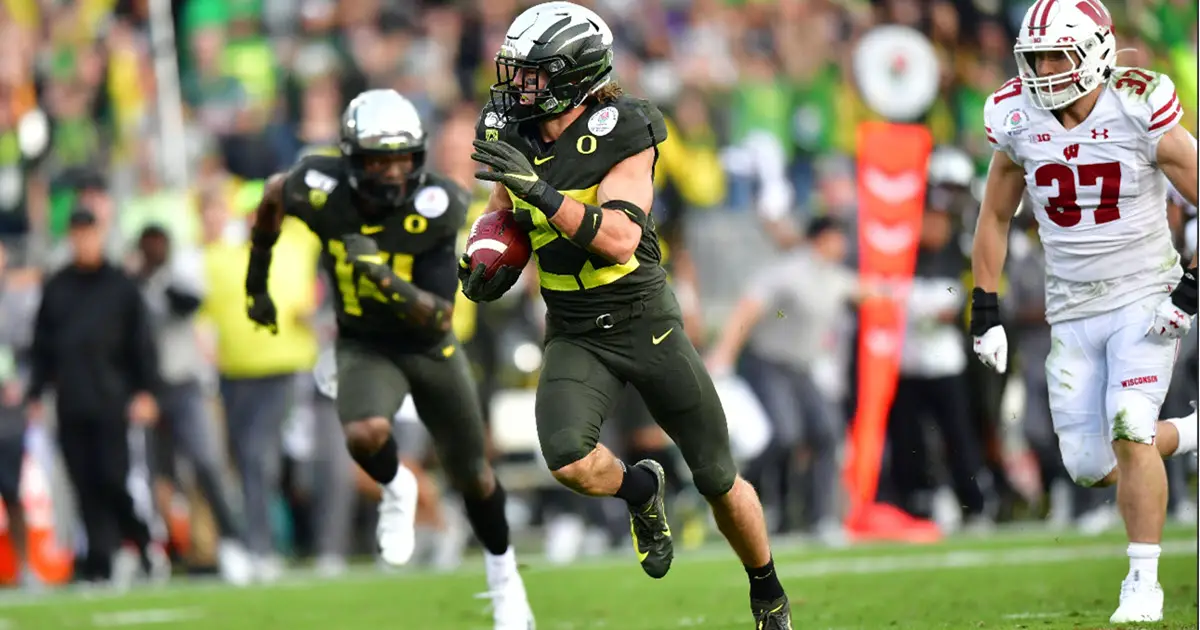Oregon started the 2020s right, beating Wisconsin 28-27 on January 1st in front of a massive crowd of more than 90,000 screaming fans.
The Ducks started the previous decade in the Rose Bowl as well, falling to Ohio State. The following year they lost the BCS National Championship to Auburn, before finally getting their first bowl win of the 2010s in 2012. They won the Rose Bowl against Wisconsin, in front of an earlier raucous crowd of 90,000 plus. They beat the Badgers by only one score; 45-38.
Which of the Oregon teams was better, though: the 2011-2012 squad led by LaMichael James and coached by Chip Kelly, or the 2019-2020 group led by Justin Herbert and coached by Mario Cristobal?
Offense vs Offense: Speed vs Efficiency

De’Anthony Thomas was FAST!
2011 was the heyday of the Oregon offense. Championed by James, QB Darron Thomas and a group of underrated and athletic offensive lineman, the 2011-2012 Ducks scored an astounding 645 points, or 46.1 points per game.
James was a workhorse, averaging an impressive 129 yards per game, with a back breaking 7.2 yards per carry. Freshman De’Anthony Thomas was a home run threat on every play, averaging a touchdown every 6.3 touches. The passing attack was impressive, going for 39 touchdowns to only 7 interceptions.
2011 was the heyday of Kelly and his fast-moving offense, getting out in front of teams and then suffocating them as games wore on with continuous scoring.

Herbert showed a lot of grit during the 2020 Rose Bowl.
The 2019 Ducks were a different story on offense. Led by senior QB Justin Herbert, running back CJ Verdell and perhaps the best offensive line in school history, the offense scored a respectable 495 points, good for 35.4 points per game.
Verdell dealt with small injuries throughout the season, ending up averaging only 87 yards per game with 8 touchdowns on the season. Johnny Johnson III was the most consistent wide receiver in 2019, catching 57 passes for 836 yards and 7 touchdowns. He was a stable force in an unstable unit. Herbert capped the second-best statistical career in school history with 3,471 yards and 32 touchdown passes, throwing the ball into some of the tightest windows of any QB in the country.
The 2019 offense struggled to score at times, scoring fewer than 30 points in 6 of their 14 games — a stat achieved by the 2011 team only one time, in the season opener vs LSU.
The verdict on the offenses is simple; the 2019 offense scored far less, they scored more slowly, and they were the type of offense that could disappear for quarters at a time. The 2011 team never looked back after their season opening loss as far as scoring went. The 2011 offense had three running backs (James, Thomas and Kenjon Barner) who would arguably start on the 2019 team. The receiving corps in 2011 was more consistent, and caught more touchdowns over the season.
The 2019 group had a better quarterback in a worse system. Herbert had an impressive year, throwing for more yards and fewer interceptions, but Thomas threw more touchdowns and was a lethal running threat for the entire season. The offensive line in 2019 is the main area where the 2019 offense is remarkably better than the 2011 offense. The 2019 crew was often working against crowded defensive fronts, and still did a lot to make room for a group of running backs who struggled to run through contact.
The advantage goes to the 2011 offense.
Defense vs Defense: Bend, Don’t Break

Both teams were fantastic at forcing turnovers!
The 2011 defense, along with all Kelly and Mark Helfrich defenses, will be remembered for giving up a lot of points. The simple truth is that their offenses were scoring so quickly, that their defensive coordinators, in this case Nick Aliotti, had to scheme a defense that had to be on the field nearly twice as much as their offense.
Led by pass rusher Dion Jordan, safety Eddie Pleasant and standout cornerback Cliff Harris, the defense essentially invented the “bend-don’t-break” mantra, surrendering an eye-popping 390.1 yards per game, while giving up only 24.6 points per game. The team did this by forcing more than two turnovers per game, and using its high-scoring offense to put teams in situations where passes were likely.
The defense was exploited over the years by teams with large offensive lineman and running back capable of running through contact. The 2011 team also struggled against teams with elite QBs, losing to USC and QB Matt Barkley, and struggling in the Rose Bowl against Russell Wilson.
The 2019 defense is arguably the best defense in school history. Holding eight opponents under 20 points, the 2019 crew gave up an average of only 16.5 points per game.
Headlined by linebacker Troy Dye, safety Brady Breeze and freshman phenom Kayvon Thibodeaux, the 2019 squad used many some of the “bend-don’t-break” tactics of the 2011 team, but to much greater effect. The team also forced turnovers at a high rate, coming in at just under two per game. However, giving up only 329.1 yards per game, and having one of the top red zone defenses allowed the unit to top the 2011 group.
The 2019 defense had no major, exploitable weakness. They lacked size in the secondary, but made up for it with suffocating coverage and an elite pass rush. The 2019 unit allowed only six of their opponents to match the average points allowed of the 2011 group.
The 2019 defense gets the edge.
Verdict: This Would Be a GREAT Matchup
Sadly, the two teams will never meet. The debate will never truly be settled about who is better, but after careful analysis, the winner of the game would be:
The Oregon Ducks!
Ryan Robertson
Yuma, ArizonaTop Photo Credit: Tom Corno
 Natalie Liebhaber, the FishDuck.com Volunteer Editor for this article, works in the financial technology industry in Bozeman, Montana.
Natalie Liebhaber, the FishDuck.com Volunteer Editor for this article, works in the financial technology industry in Bozeman, Montana.
Ryan Robertson is a defense contractor for the United States Marine Corps. A lifelong Duck fan from Grants Pass, he joined the Army out of high school. After four years as an Intelligence Analyst he decided it was time to further his education and pay more attention to his Ducks. One of Ryan’s first memories is of watching the Ducks, led by Joey Harrington, beating up on the Utah Utes in 2001. His grandfather ran track at Oregon in the ‘50s. He loves the Ducks, and has a passionate interest in reading every scrap of analysis centered around the football team.

